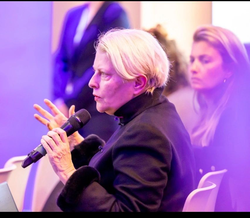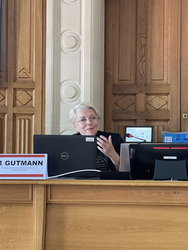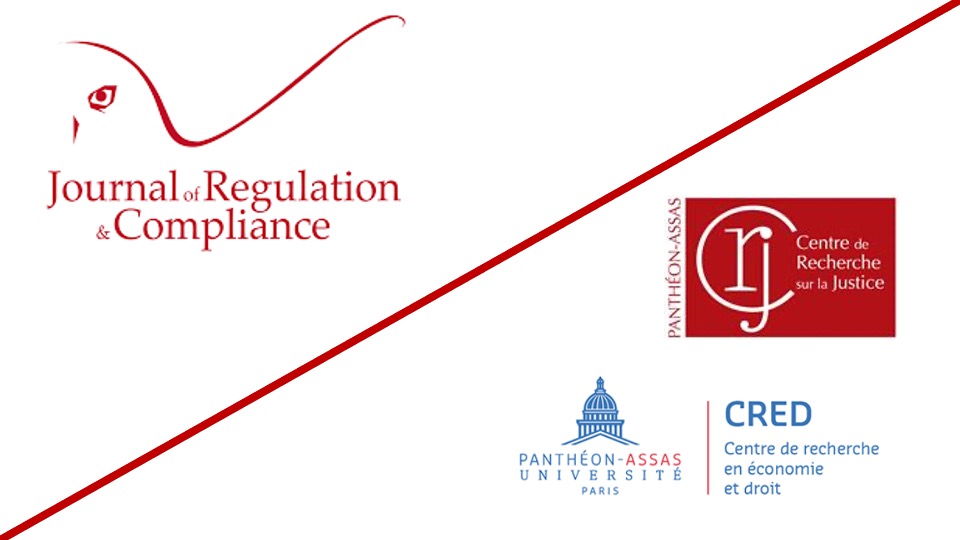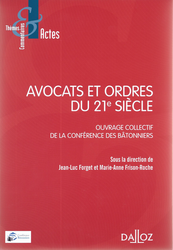Jan. 14, 2026
Thesaurus : Doctrine
► Référence complète :E. Roudinesco, "Donald Trump. Sur le pouvoir délirant de la Maison-Blanche", Le Grand Continent, 16 janvier 2026.
____
🦉Cet article est accessible en texte intégrale pour les personnes qui suivent les enseignements de la professeure Marie-Anne Frison-Roche.
_________
Oct. 5, 2025
Newsletter MAFR - Law, Compliance, Regulation

🌐follow Marie-Anne Frison-Roche on LinkedIn
🌐subscribe to the Newsletter MAFR Regulation, Compliance, Law
🌐subscribe to the Video Newsletter MAFR Surplomb
🌐subscribe to the Newsletter MaFR Droit & Art
____
► Full Reference: M.-A. Frison-Roche, ""Juge modeste" ou "check and balance" :alternative aux Etats-Unis, alternative en France" ("modest judge" or "check and balance": alternative in the United States, alternative in France), Newsletter MAFR Law, Compliance, Regulation, 6 October 2025..
____
📧Read by free subscription other news from the MAFR Newsletter - Law, Compliance, Regulation
____
► Summary of this article: Recent, if not forthcoming, decisions by the US Supreme Court show that the American political system that was based on the unwritten principle of Check and Balance, requiring the Justices to constitute one Power facing the other two could be replaced by a political system based on the principle of a "modest Justice" enforcing decisions made by the Federal Executive. They would then have a new Constitution.
In Western Europe and especially in France, it is possible that the letter of the Constitution, which states that judges are not an autonomous power vis-à-vis the other two powers, will be abandoned and that, in the name of an unwritten principle, the Rule of Law, its transformation into an autonomous Power facing the executive in its own right will be adopted. The path would be exactly the opposite. We would then have changed the Constitution.
That's conceivable, and there are many arguments in favour of it.
We have to say so. And draw all the consequences.
____
📧read below the article published the 6 October dans the Newsletter MAFR - Law, Compliance, Regulation ⤵️
March 11, 2025
Conferences

🌐follow Marie-Anne Frison-Roche sur LinkedIn
🌐subscribe to the Newsletter MAFR Regulation, Compliance, Law
🌐subscribe to the Video Newslette MAFR Surplomb
____
► Full Reference : M.-A. Frison-Roche, "Le juriste, requis et bien placé pour le futur" (The lawyer needed and well placed for the future), in Groupe Lamy Liaisons, Les Éclaireurs du Droit, Hôtel de l’Industrie, Place Saint Germain des Près, Paris, 11 March 2025, 16h.
____
This speech opens a series of 4 workshops on the following themes:
- The challenge of Trust
- The challenge of Risk
- The challenge of Transmission
- The challenge of leadership
____
🧮see the full programme of this manifestation (in French)
____
⬜see the slides basis made for this speech (which were not projected) (in French)
____
🎥 watch the short video made after the conference (in French)
____
► English Summary of this introductory conference: The 4 sessions will address the successive themes of trust, risk, transmission and leadership, which legal professionals are facing, particularly as a result of algorithms.
For an introductory analysis, it is possible to make a distinction inside the Future.
The future has a part of Stability: the jurist can contribute to this stability, i.e. the preservation of the past (I).
The future has an part of Predictability: the lawyer must increase this part in the present itself (II).
The future has a part of radical novelty (III): at this point, which may correspond to a precipice, if no one had imagined it, the lawyer can also be there. Until now, we think of lawyers more in the first 2 hypotheses, less in this one. Is it pertinent?
In each of these dimensions, the algorithmic system (AI) is presented as replacing or dominating the human.
In each of these 3 dimensions, Lawyers must be present, as they form a community that must remain united around the very idea of Law (algorithms do not conceive ideas, it is humans who transmit them to other humans, and the algorithmic system must remain a medium).
As far as the Stability of the future is concerned, the Lawyer can and must contribute to it, in particular through Transmission, because there is less of a blank page as algorithmic 'creation' is based on past data, and training, where the human being will be all the more central as machines have to be handled.
As far as the Predictability of the future is concerned, it is a question of assessing the Risks, whether specific or systemic, legal or non-legal, in order not to take them or on the contrary to take them. The more the Lawyer is involved in risk-taking, the more he or she will be in the right place, before and during the action.
As far as the Radically New future is concerned, it is not easy to qualify AI as such or not, but now the possible disappearance of the Rule of Law in the United States is one of them. All Lawyer are expected. Every lawyer must have two virtues (which the algorithm cannot not have): the virtue of Justice and the virtue of Courage. It is these virtues that we must pass on and share.
____
Current events have led me to devote the time available to me to focusing on a single perspective, the third, to say what is expected of Lawyers if we perceive something radically new in the near future, what everyone does.
Indeed, in the United States, on the one hand there is a head of state for whom the Law does not exist and who uses the power of regulation to express his absolute indifference to other states, companies and human beings, and on the other an entrepreneur who claims that he is going to become the master of algorithmic technology, a system over which he already wields great power.
Faced with this Radical Novelty, we expect the community of Lawyers, all lawyers, whatever their place, their technical mastery, their level, their nationality, to speak out and say No. As Kelsen, Cassin or Ginsberg did. Say No and help others to say No. To do this, Lawyers, as human beings who care about other human beings, must be aware of the twofold virtue expected of them: the virtue of commitment to Justice and the virtue of Courage.
________
Nov. 9, 2023
Publications

🌐follow Marie-Anne Frison-Roche on LinkedIn
🌐subscribe to the Newsletter MAFR Regulation, Compliance, Law
____
► Full Reference: M.-A. Frison-Roche, "Reinforce the Judge and the Lawyer to impose Compliance Law as a characteristic of the Rule of Law", in M.-A. Frison-Roche (ed.), Compliance Jurisdictionalisation, Journal of Regulation & Compliance (JoRC) and Bruylant, "Compliance & Regulation" Serie, 2024, pp. 39-65
____
📝read the article
____
🚧read the bilingual Working Paper which is the basis of this article, with additional developments, technical references and hyperlinks
____
📘read a general presentation of the book, Compliance Jurisdictionalisation, in which this article is published
____
► This article is the introduction of the book.
► Summary of the article (done by the Journal of Regulation & Compliance): One can understand that the compliance mechanisms are presented with hostility because they seem designed to keep the judge away, whereas there is no Rule of Law without a judge. Solid arguments present compliance techniques as converging towards the uselessness of the judge (I). Certainly, we come across magistrates, and of all kinds, and powerful ones, but that would be a sign of imperfection: its ex-ante logic has been deployed in all its effectiveness, the judge would no longer be required... And the lawyer would disappear so with him...
This perspective of a world without a judge, without a lawyer and ultimately without Law, where algorithms could organize through multiple processes in Ex Ante the obedience of everyone, the "conformity" of all our behaviors with all the regulatory mass that is applicable to us, supposes that this new branch of Law would be defined as the concentration of processes which gives full effectiveness to all the rules, regardless of their content. But supposing that this engineer's dream is even achievable, it is not possible in a democratic and free world to do without judges and lawyers.
Therefore, it is imperative to recognize their contributions to Compliance Law, related and invaluable contributions (II).
First of all, because a pure Ex Ante never existed and even in the time of the Chinese legists📎!footnote-2689, people were still needed to interpret the regulations because a legal order must always be interpreted Ex Post by who must in any case answer the questions posed by the subjects of law, as soon as the political system admits to attributing to them the right to make claims before the Judge. Secondly the Attorney, whose office, although articulated with the Judge's office, is distinct from the latter, both more restricted and broader since he must appear in all cases where the judicial figure puts himself in square, outside the courts. However, Compliance Law has multiplied this since not only, extending Regulatory Law, it entrusts numerous powers to the administrative authorities, but it also transforms companies into judges, in respect of which the attorneys must deal with.
Even more so, Compliance Law only takes its sense from its Monumental Goals📎!footnote-2690. It is in this that this branch of the Law preserves the freedom of human beings, in the digital space where the techniques of compliance protect them from the power of companies by the way that the Compliance Law forces these companies to use their power to protect people. However, firstly, it is the Judges who, in their diversity📎!footnote-2691, impose as a reference the protection of human beings, either as a limit to the power of compliance tools📎!footnote-2692 or as their very purpose. Secondly, the Attorney, again distinguishing himself from the Judge, if necessary, reminds us that all the parties whose interests are involved must be taken into consideration. In an ever more flexible, soft and dialogical Law, everyone presenting himself as the "advocate" of such and such a monumental goal: the Attorney is legitimate to be the first to occupy this place.
________
June 14, 2023
Conferences

♾️follow Marie-Anne Frison-Roche on LinkedIn
♾️subscribe to the Newsletter MAFR Regulation, Compliance, Law
____
► Full Reference: M.-A. Frison-Roche, "Compliance et droit processuel" ("Compliance and Procedural Law"), in B. Deffains, M.-A. Frison-Roche and J.-B. Racine (dir.), Journal of Regulation & Compliance (JoRC) and University Panthéon-Assas (Paris II), Compliance : Obligation, devoir, pouvoir, culture (Compliance : obligation, duty, power, culture), University Panthéon-Assas, Salle des Conseils, 14 June 2023.
____
🧮See the full programme of this event

____
🎤see the other speech made during the first day of this symposium : "L'obligation de compliance, entre volonté et consentement : obligation sur obligation vaut" ("Compliance Obligation, between will and consent: obligation on obligation works")
____
► Summary of the conference: After referring to the chapter in the book Compliance Jurisdictionalisation, which deals more specifically with Procedural Law
The first development relates to the fact that the relationship between Compliance Law and Procedural Law is very difficult because it is often said that they simply have nothing to do with each other, or that they have everything to dislike each other. This is because Compliance is often reduced to processes, and to the mechanical place that algorithms could take in it, in taking care of everything.
Compliance would even have the purpose and effect of ensuring that the company and its managers never come into contact with a judge, the public prosecutor being their best ally in this respect.
Secondly, I recalled the very common idea that Procedural Law is a kind of 'tribute' that the rule of Law demands, which certainly weighs down companies when compared with companies living in systems in which there's not not such a price.
But many stress that Procedural Law could become a model. This can be justified and technically anticipated because it has already happened in Regulation Law, and Compliance Law is the deployment of it
In the third stage, I worked on the alliance between the two, with the procedure (rather than the process) modifying compliance and thereby reinforcing it, evoking the way in which this can manifest itself technically
In the fourth step, I looked for what would be the "naturally appropriate procedure" for Compliance: one that takes into account the duration and the development of "solutions", to which the notion of "sustainability", which is central in the substantive Law of Compliance, refers.
In a fifth stage, and devoting more time to this, I have pointed out where innovation should be the strongest: the proof, the probatory obligation being the "part totale" ("total part") of the compliance obligation. This major issue will be the subject of a series of symposiums held in 2024.
________
See the articles that are part of the Second chapter of the book 🕴️M.-A. Frison-Roche (ed.), 📘Compliance jurisdictionalisation, 2023 :
- 🕴️N. Cayrol, 📝General Procedural Law in Compliance Law,
- 🕴️F. Ancel, 📝The procedural principle of compliance, a new trial leading principle?,
- 🕴️B. Sillaman, 📝Privilege and Cooperation: Procedural Lessons Learned from the U.S. for Global Application,
- 🕴️A. Linden, 📝Motivation and publicity of the decisions of the restricted committee of the French Personal Data Protection Commission (Commission nationale de l'informatique et des libertés-CNIL) in a compliance perspective,
- 🕴️S. Scemla and 🕴️D. Paillot, 📝The supervisory Authorities face difficulties to apprehend the Rights of the Defense,
- 🕴️M.-A. Frison-Roche, 📝Adjusting by the nature of things General Procedural Law to Compliance Law.
🕴️M.-A. Frison-Roche, 🚧From Regulation Law to Compliance Law, 2017.
🕴️M.-A. Frison-Roche, 🎤Le rôle du Juge dans le déploiement du Droit de la Régulation en Droit de la Compliance (The role of the Judge in the deployment of Regulatory Law in Compliance Law), in 🧮De la Régulation à la Compliance : quel rôle pour le Juge ?, 2023.
Notably in this perspective, 🕴️M.-A. Frison-Roche and 🕴️M. Boissavy, 📕Compliance et droits de la défense. Enquête interne - CJIP - CRPC (Compliance and Due Process. Internal Investigation - DPA), 2024.
April 3, 2023
Interviews

♾️follow Marie-Anne Frison-Roche on LinkedIn
♾️subscribe to the Newsletter MAFR Regulation, Compliance, Law
____
► Full Reference: M.-A. Frison-Roche & M. Boissavy, "Colloque : « Avocat et droits de la défense dans les enquêtes internes et la justice négociée »" ("Symposium: "Lawyers and rights of the defence in internal investigations""), interview with Olivia Dufour, Actu-Juridique, 3rd April 2023.
____
💬read the interview (in French)
____
► Presentation of the interview by the journal (in French): "Le Conseil national des barreaux (CNB) organise les 20 et 21 avril prochains un colloque intitulé « Avocat et droits de la défense dans les enquêtes internes et la justice négociée ». Matthieu Boissavy, avocat aux barreaux de Paris et de New York, médiateur et vice-président de la commission Libertés et droits de l’Homme du Conseil national des barreaux et Marie-Anne Frison-Roche, professeure de droit, directrice du Journal of Regulation and Compliance nous expliquent les enjeux de ces nouvelles pratiques judiciaires qui bousculent le rôle traditionnel des acteurs de la justice, qu’il s’agisse des avocats ou des magistrats."
____
► Questions asked (in French):
- Le CNB organise les 20 et 21 avril prochains un colloque sur le thème : Avocats et droits de la défense dans les enquêtes internes et la justice négociée. Pourquoi ce choix ?
- La compliance n’est-elle pas en train de bouleverser le métier d’avocat ?
- Comment cela se traduit-il en pratique ?
- Quelles sont les implications déontologiques, ne faut-il pas inventer de nouvelles règles ?
- Qu’est-ce que la CJIP a changé dans le métier d’avocat ?
- Quels sont les nouveaux risques pour l’avocat ?
- Cela modifie-t-il les relations entre avocats, parquet et juges du siège ?
________
Feb. 2, 2023
Publications

♾️ follow Marie-Anne Frison-Roche on LinkedIn
♾️ subscribe to the Newsletter MAFR Regulation, Compliance, Law
____
► Full Reference: M.-A. Frison-Roche, "Conforter le rôle du Juge et de l'Avocat pour imposer la Compliance comme caractéristique de l'État de Droit" ("Reinforce the Judge and the Attorney to impose Compliance Law as a characteristic of the Rule of Law"), in M.-A. Frison-Roche (dir.), La juridictionnalisation de la Compliance, coll. "Régulations & Compliance", Journal of Regulation & Compliance (JoRC) and Dalloz, 2023, p. 29-55.
____
► This article is the introduction of the book.
____
📝read the article (in French)
____
🚧read the bilingual Working Paper which is the basis of this article, with additional developments, technical references and hyperlinks
____
📕read a general presentation of the book, La juridictionnalisation de la Compliance, in which this article is published
____
► Summary of the article (done by the Journal of Regulation & Compliance): One can understand that the compliance mechanisms are presented with hostility because they seem designed to keep the judge away, whereas there is no Rule of Law without a judge. Solid arguments present compliance techniques as converging towards the uselessness of the judge (I). Certainly, we come across magistrates, and of all kinds, and powerful ones, but that would be a sign of imperfection: its ex-ante logic has been deployed in all its effectiveness, the judge would no longer be required... And the lawyer would disappear so with him...
This perspective of a world without a judge, without a lawyer and ultimately without Law, where algorithms could organize through multiple processes in Ex Ante the obedience of everyone, the "conformity" of all our behaviors with all the regulatory mass that is applicable to us, supposes that this new branch of Law would be defined as the concentration of processes which gives full effectiveness to all the rules, regardless of their content. But supposing that this engineer's dream is even achievable, it is not possible in a democratic and free world to do without judges and lawyers.
Therefore, it is imperative to recognize their contributions to Compliance Law, related and invaluable contributions (II).
First of all, because a pure Ex Ante never existed and even in the time of the Chinese legists, people were still needed to interpret the regulations because a legal order must always be interpreted Ex Post by who must in any case answer the questions posed by the subjects of law, as soon as the political system admits to attributing to them the right to make claims before the Judge. Secondly the Attorney, whose office, although articulated with the Judge's office, is distinct from the latter, both more restricted and broader since he must appear in all cases where the judicial figure puts himself in square, outside the courts. However, Compliance Law has multiplied this since not only, extending Regulatory Law, it entrusts numerous powers to the administrative authorities, but it also transforms companies into judges, in respect of which the attorneys must deal with.
Even more so, Compliance Law only takes its sense from its Monumental Goals. It is in this that this branch of the Law preserves the freedom of human beings, in the digital space where the techniques of compliance protect them from the power of companies by the way that the Compliance Law forces these companies to use their power to protect people. However, firstly, it is the Judges who, in their diversity, impose as a reference the protection of human beings, either as a limit to the power of compliance tools or as their very purpose. Secondly, the Attorney, again distinguishing himself from the Judge, if necessary, reminds us that all the parties whose interests are involved must be taken into consideration. In an ever more flexible, soft, and dialogical Law, everyone presenting himself as the "advocate" of such and such a monumental goal: the Attorney is legitimate to be the first to occupy this place.
________

Updated: Sept. 25, 2021 (Initial publication: March 25, 2021)
Publications

 ► Référence complète : Frison-Roche, M.-A., Instituer l'insécurité juridique comme principe, outil de prévention des crises systémiques catastrophiques totales, document de travail, mars et septembre 2021.
► Référence complète : Frison-Roche, M.-A., Instituer l'insécurité juridique comme principe, outil de prévention des crises systémiques catastrophiques totales, document de travail, mars et septembre 2021.
____
► Ce document de travail fait suite à deux précédents documents de travail, réalisés pour le colloque qui s'est tenu à la Cour de cassation le 22 mars 2021.
Le premier avait été conçu et en partie réalisé longtemps avant sa tenue pour traiter le sujet selon les canons habituels attendus ;
Le second a été élaboré le veille de sa tenue sur 4 cas car la disparition de mes serveurs en raison d'un incendie, ayant également touché les copies de ceux-ci ne me permettait pas autre chose, les organisateurs m'ayant demandé de maintenir pourtant ma participation, ce dont je les remercie 📎
Le présent document de travail a été élaboré après la tenue du colloque afin que les organisateurs de ce colloque, au thème si aventureux, ne pensent pas qu'ils ne pouvaient pas compter sur moi.
Ce document de travail vise à dépasser ces avanies et à opérer la connexion du sujet pour lequel une contribution m'a été demandée (la crise économique) avec le sujet plus général qui me retient par ailleurs : la construction de la nouvelle branche qu'est le Droit de la Compliance, pourquoi le faire et comment le faire.
____
Introduction : Comme à tous, ce sujet de "L'insécurité juridique" me pose difficulté. Parce que, n'étant pas grand personnage solitaire affrontant l'inconnu, comme tous les autres je voudrais plutôt la sécurité que l'insécurité, et tous les mots qui ne commencent pas par une négation : je voudrais le connu plutôt l'inconnu, je voudrais être comprise qu'incomprise, et ce n'est plus par confort que par urgence morale je voudrais vivre dans un monde juste plutôt que dans un monde injuste. C'est d'ailleurs pour cette dernière raison que je vais affronter l'aventure de l'Insécurité juridique comme principe premier, et non pas comme exception au principe de la Sécurité juridique 📎
Cet ajout du "in" signale paradoxalement un retranchement : le "in" montre ce qui manque, comme le monde blessé qu'est le monde injuste. Me voilà invitée à traiter un sujet par avance abîmé, car l'insécurité juridique c'est déjà comme une agression : un monde amputé de sa sécurité, comme c'est désagréable.
C'est encore plus vrai pour "l'insécurité juridique". En effet, la notion fait face à la "sécurité juridique", cette sorte d'apport spécifique que le Droit offre au monde. La "sécurité juridique" est aujourd'hui comme un Totem, qui serait indissociable du Tabou de l'Insécurité. Dans le monde juridique épuisé dans lequel nous ne serions plus aptes qu'à proposer quelques notions procédurales, surtout pas de notions substantielles car immédiatement taxées d'être trop politiques 📎
La sécurité juridique, parce que les systèmes juridiques n'auraient plus que cela à offrir, revendiquant par ailleurs leur neutralité et se rejoignant donc sur cette constance, cette cohérence, et cette confiance produites par cette sécurité, est notre nouveau doudou.
A cela, l'on apporte nuances dans les modalités, en soulignant que les circonstances changeantes de la vie exigent un peu de flexibilité, que le pragmatisme et des situations concrètes et particulières qui sans cesse varient impliquent de prévoir dès aujourd'hui que demain le contexte aura changé : il faut organiser de la prévisibilité dans le changement. De cela, le Droit souple s'en charge, les lignes directrices étant les nouvelles voies romaines qui nous montreront le chemin. Sécurité et flexibilité, dans un pragmatisme qui voit dans tout principe substantiel un signe de rigidité, voilà notre nouveau mantra.
L'insécurité juridique est ainsi notre Tabou, dont les admissions justifiées seraient autant d'hommages rendus au Totem de la sécurité juridique, Totem et Tabou se renforçant toujours. Il y aurait donc imperfection du système juridique si l'on haussait l'insécurité au rang de véritable principe. C'est pourquoi lorsqu'on fait l'effort de parler d'insécurité juridique, on semble ne le faire que sur le mode de l'exception : l'insécurité juridique, cela serait ce qu'il est admissible de supporter comme exception légitime au principe de la sécurité juridique 📎
L'on aura donc tendance à traiter de l'insécurité juridique comme une sorte de principe supportable lorsque quelque chose justifie qu'on porte atteinte au véritable principe premier qu'est la Sécurité juridique. C'est ailleurs ainsi le plus souvent qu'on l'aborde . Ce n'est donc pas le traiter comme un véritable principe, juste comme une exception supportable.
Voilà pourquoi l'on m'a demandé d'examiner si l'insécurité juridique était supportable, admissible, lorsqu'il y a crise économique. Sans doute parce que lorsqu'il y a crise économique, alors tant pis les principes doivent un peu baisser pavillon et l'on fait avec les moyens du bord en admettant des exceptions, bien qu'avec beaucoup de réticences et de regrets 📎
L'insécurité juridique n'aurait donc qu'un temps, parce que par nature la crise elle-même n'a qu'un temps. La fin de la crise, la fin des problèmes et d'une situation anormale feraient disparaître le principe d'insécurité juridique, lequel serait donc un principe pathologique.
Mais ce n'est pas parce que cette description semble partagée par beaucoup que ses prémisses soient exacts. En effet, la "crise" est-elle si exceptionnelle que ce qui justifie que l'insécurité juridique, qui permet d'aider à sa résolution, le soit aussi ? Si l'on constate plutôt que la crise est non seulement notre "ordinaire", et qu'en plus notre "ordinaire catastrophique" est "prévisible", voire virtuellement déjà là, et qu'en plus dans le futur, ce qui risque d'arriver est une crise catastrophique totale qui pourrait bien être définitive dans ses effets (ce qui enlève à la crise sa nature temporaire et le retour au "vrai principe" également), alors le principe exceptionnel, cantonné dans la crise, doit sortir de l'hypothèse de celle-ci pour venir pleinement dans le Droit présent afin d'empêcher que se réalise cet ordinaire catastrophique.
Oui, regardons vers le futur : ne sont-ce pas de monumentales crises qui sont devant nous ? Et l'enjeu n'est-il pas d'adopter des principes premiers pour qu'elles n'adviennent pas ? S'il en est ainsi, alors l'absence de changement, la constance et le prévisible, c'est-à-dire le principe même de la Sécurité juridique, si choyé, n'est-ce pas ce qui fait obstacle à la prévention de l'advenance des crises économiques qui nous menacent ? Certes c'est sans doute une crise sanitaire et une crise écologique et climatique qui nous sont devant nous, mais de la même façon la crise économique de 2020 n'est elle-même qu'un accessoire de la crise sanitaire mondiale, prémisses de ce qui pourrait arriver.
Si nous sommes dans cette situation mondiale alors, ce n'est pas une conception procédurale des principes qu'il faut retenir, mais une conception politique. De la même façon, dans cette perspective ce n'est pas en terme d'exception, de "principe exceptionnel" mais bien en terme de principe premier qu'il faut penser l'Insécurité juridique, c'est-à-dire en terme d'éveil et d'aventure, car demain pourrait n'être pas du tout comme aujourd'hui. Seul le principe inverse de l' "Insécurité juridique" pourrait alors exprimer la volonté d'y répondre (II).
_____
► Lire ci-dessous les développements du document de travail ⤵
L'incendie d'OVH peut simplement être pris comme un exemple de crise. V. infra ⤵
Ce qui occupe la seconde partie de la présente étude.
Ainsi le Droit de la Compliance a longtemps été présenté comme une simple procédure d'effectivité des règles, ce qui rassure, plutôt que ce qui est sa définition substantielle, à savoir des "Buts Monumentaux", notamment sociaux et climatiques, qui lui donne toute son ampleur et révèle sa nature profondément politique. V. Frison-Roche, M.-A. ✏️Notes pour une synthèse opérée sur le vif des travaux du colloque : "Les Buts Monumentaux du Droit de la Compliance : radioscopie d'une notion" la notion de Buts Monumentaux du Droit de la Compliance, 2021 ; et voir plus généralement Frison-Roche, M.-A. (dir), 📕 Les Buts Monumentaux de la Compliance, 2022.
Contre cela, Frison-Roche, M.-A., Non, je n'aime pas la réglementation, septembre 2021.
Il en est de même du principe de proportionnalité. Mais là aussi il serait adéquat de penser les choses différemment. Voir une démonstration dans ce sens, Frison-Roche, M.-A., Définition de la proportionnalité et Définition du Droit de la Compliance, 2021.
Pour une description du choc que la loi déclarant "l'Etat d'urgence sanitaire" fit sur la doctrine juridique, Gelbrat, A. et , Etat d'urgence sanitaire : la doctrine dans tous ses états, 2020.
Ce sont souvent dans ces termes que la doctrine s'exprime. Par exemple 📝Kamgaing, P.-C., Crise sanitaire et procédures judiciaires : étude de droit processuel, 2020, évoquant le fait que le droit processuel est "bafoué".
June 24, 2021
Compliance: at the moment

► Compliance Law is above all a Time Management. This is why it is located in Ex Ante, before disasters happen, with the goal that they do not happen, to intervene at least on time to break the domino effect. This is why the achievement of Monumental Goals has been internalized in companies, this achievement being until now States’ affair. This does not mean that Ex Post is irrelevant. Especially because when the Ex Post entities are the most legitimate. It is the case of Judges. What has just happened to Rudy Giuliani illustrates this perfectly.
____
On June 24, 2021, the Supreme Court of the State of New York published its decision concerning Rudy Giuliani (➡️⚖️Supreme Court of the State of New York Appellate Division, First Judicial Department, June 24, 2021, Giuliani)
Rudy Giuliani, who was federal prosecutor, then mayor of New York, then counsel to President Donald Trump, then lawyer was sentenced to the provisional suspension of his professional license in the State of New York (➡️📝New York Times, Court Suspends Giuliani's Law License, citing Trump Election lies, June 24, 2021).
The judgment evokes the insurrectionary events in the Capitol and relies on an ethics committee for the conduct that lawyers must have. First the convergence is remarkable in the motivation between the decisions made by Facebook with regard to Donald Trump, the professional structure to which Rudy Giuliani belongs and the decision of the state court (I).
The articulation is rather done in time (II). First of all, the company which intervenes as quickly as possible, because it is necessary to act (but for acting, it is also necessary to "judge", even if the entity is not a tribunal ...); then the profession (and here the person concerned belongs to a regulated profession but it is indeed in the name of "the general public interest" that the sanction will be pronounced), nothing that can escape the in fine validation or questioning of the Judge.
I. The articulation of the substantive principles implemented by the Company, the Jurisdiction and the Professional Regulator
In a Rule of Law, fundamental principles are the same for subjects of Law (companies being subjects of Law like others), intermediary bodies (like professional orders), jurisdictions and States.
In a Rule of Law, Truth is elementally kept by Law and Disinformation is sanctioned.
Thus, even if the power of Freedom of Speech in the United States has a constitutional power unlike any other, since "disinformation" is not sanctioned as such, the legal path of defamation action makes it possible to obtain protection against practices of massive disinformation.
Even if historians have worried about the paradoxical weakness of the United States because of its legal system (see 💻Snyder, T., The State of Our Democracy, 2021) Harvard Law professors have intervened to explain that no one could say everything, defamation action allowing a reaction.
This is the path that was used in January 2021 against Rudy Giuliani (➡️📝New York Times, Rudy Giuliani sued by Dominion Voting Systems over False Election Claims, May 4, 2021) for having unleashed a viral campaign of disinformation about what was presented as an incorrect result during the presidential election.
It is therefore "disinformation" which is sanctioned.
It was also prevented by systemic digital companies such as Google, Twitter, Facebook and Instagram, which disabled Donald Trump’s accounts, the other actor.
But besides, Rudy Giuliani is a lawyer.
As such, what he does engages the honor of his profession. It is therefore intended to be the subject of disciplinary procedures.
This is why the jurisdiction of the State of New York took advice from an "ethics committee".
In particular with regard to the conclusions of the latter, the state jurisdiction declared that the false statements "tarnished the entire reputation of the legal profession". This justified his suspension in New York State. This suspension is temporary (disciplinary procedures will begin).
But on the other hand, the Court considers that the deontologically objectionable conduct "directly" increased the tensions which led to the violence of the events in the Capitol.
By taking such a justification, the Court operates the junction on the one hand with the other character that Rudy Giuliani advised, Donald Trump, but especially with the decision taken by the private companies, which suspended Donald Trump’s accounts.
Thus, in the name of the same principles, Public Order and respect for Truth, the Court by connecting, through its motivation, Companies - which had acted before - and Disciplinary Body which will intervene afterwards, has shown the coherence of the American legal system.
II. The articulation over time between crucial companies, jurisdictions and professions
The difficulty comes rather from the articulation in time.
Indeed, in this Donald Trump’s case who, in particular legally advised by Rudy Giuliani, affirmed that the elections had been stolen, which contributed to a start of insurgency and riots in Capitol, the question is the reaction time and the modality of reaction.
The first type of bodies which react were systemic digital companies: Google, Twitter, Facebook.
The modality was the deletion of Donald Trump's accounts, with the justification for inciting destabilization and civil war.
Controlling "hate speech", in Europe in name of Law, in the United States in name of Corporate Social Responsibility (CSR).
Therefore, the company is therefore instituted "Judge and prosecutor of itself" by Compliance Law, because it is in position to act at the right time, that is to say immediately (see ➡️📅 the colloquium, co-organized by the Journal of Regulation & Compliance and Lyon 3 University, The Firm instituted as Judge and Prosecutor of itself, Compliance Juridictionnalization, 2021).
It is remarkable that, despite all the criticisms that can legitimately be made of it (see eg Heymann, J., La nature juridique de la "Cour suprême" de Facebook" (The legal nature of the "so-called" Supreme Court of Facebook), in The Firm instituted as Judge and Prosecutor of itself, already quoted above.) this jurisdictionalization works, as soon as the procedural principles are respected (see ➡️📝Frison-Roche, M.-A., The judge-judged: articulating words and things in face of the impossible conflict of interests, in ➡️📕Compliance Juridictionnalization, 2022).
But in fine, the decision is always to come back to the Courts and systems depend above all on the probity of people, who are most firmly anchored in "professions".
What is remarkable in the present case is that we could "wait" for the time of justice, because the sanction of the adviser - and his neutralization by a ban to practice - is less urgent than the neutralization of Donald Trump on social networks. Their power as an "influencer” is not the same.
It is however remarkable that if the court took care to rely on the opinion of an "ethics committee", it did not wait for the disciplinary sanction itself.
This will come later.
Justice itself, above all sensitive to time, therefore pronounced in advance: a "provisional" suspension. In the same way that it has often been said that closing an account in the digital space was a capital punishment, one can consider that a professional suspension was, even in "temporary" form, a capital punishment for a professional.
We can see here that Professions, here the profession of attorney, are central to Compliance mechanisms. Indeed, the more States are weakened by their natural relationship with the “border”, the more the technical notion of “Profession”, which does not have this natural relationship, will have to be developed.
However, supervised by the Judge, a Profession has ethics at its heart. The same that the Judge, in anticipation, took as a basis to sanction for the future the adviser of a president immediately dismissed by the systemic company.
So as long as crucial businesses, professional and jurisdictional structures adjust in substance, adjustment over time can work, by anticipation and feedback.
____
Nov. 16, 2019
Publications

The Finance Bill has proposed to the Parliament to vote an article 57 whose title is: Possibilité pour les administrations fiscales et douanières de collecter et exploiter les données rendues publiques sur les sites internet des réseaux sociaux et des opérateurs de plateformes (translation: Possibility for the tax and customs administrations to collect and exploit the data made public on the websites of social networks and platform operators).
Its content is as is in the text voted on in the National Assembly as follows:
"(1) I. - On an experimental basis and for a period of three years, for the purposes of investigating the offenses mentioned in b and c of 1 of article 1728, in articles 1729, 1791, 1791 ter, in 3 °, 8 ° and 10 ° of article 1810 of the general tax code, as well as articles 411, 412, 414, 414-2 and 415 of the customs code, the tax administration and the customs administration and indirect rights may, each as far as it is concerned, collect and exploit by means of computerized and automated processing using no facial recognition system, freely accessible content published on the internet by the users of the online platform operators mentioned in 2 ° of I of article L. 111-7 of the consumer code.
(2) The processing operations mentioned in the first paragraph are carried out by agents specially authorized for this purpose by the tax and customs authorities.
(3) When they are likely to contribute to the detection of the offenses mentioned in the first paragraph, the data collected are kept for a maximum period of one year from their collection and are destroyed at the end of this period. However, when used within the framework of criminal, tax or customs proceedings, this data may be kept until the end of the proceedings.
(4) The other data are destroyed within a maximum period of thirty days from their collection.
(5) The right of access to the information collected is exercised with the assignment service of the agents authorized to carry out the processing mentioned in the second paragraph under the conditions provided for by article 42 of law n ° 78-17 of January 6, 1978 relating to data processing, the files and freedoms.
(6) The right to object, provided for in article 38 of the same law, does not apply to the processing operations mentioned in the second paragraph.
(7) The terms of application of this I are set by decree of the Council of State.
(8) II. - The experiment provided for in I is the subject of an evaluation, the results of which are forwarded to Parliament as well as to the National Commission for Data Protection at the latest six months before its end. "
This initiative provoked many comments, rather reserved, even after the explanations given by the Minister of Budget to the National Assembly.
What to think of it legally?
Because the situation is quite simple, that is why it is difficult: on the one hand, the State will collect personal information without the authorization of the persons concerned, which is contrary to the very object of the law of 1978 , which results in full disapproval; on the other hand, the administration obtains the information to prosecute tax and customs offenses, which materializes the general interest itself.
So what about it?
Read below.
April 14, 2016
Thesaurus : Doctrine
► Référence complète : C. Husson, « La redéfinition permanente de l’État de droit par la Cour européenne des droits de l’homme », Civitas Europa 2016/2, n° 37) p. 183-220.
_____
Oct. 9, 2014
Publications

► Référence complète : M.-A. Frison-Roche, "Avocat et ordre. Être moderne sans se perdre" du droit", in J.-L. Forget et M.-A. Frison-Roche (dir.).Avocats et ordres du 21e siècle, coll "Thèmes et commentaires", Dalloz, 2014, p. 199-222.
____
____
📕lire une présentation de l'ouvrage dans lequel l'article est publié
____
► Résumé de l'article : L'avocat s'est construit, se définit et continuera de se définir par sa déontologie, dont l'Ordre est le concepteur et le gardien. Cette déontologie a en son cœur l'indépendance de l'avocat, une indépendance qui le marque et le distingue. Cette force explique l'intimité qui existe entre l'avocat et l'Ordre auquel il appartient et dont il dépend, les règles que l'Ordre lui applique devant lui demeurer intimes.
Cela n'empêche en rien que le droit a une valeur économique et que le cabinet d'avocat est une entreprise, rendant un service et supportant des coûts. Plus encore, la rentabilité de cette entreprise est d'autant plus nécessaire que l'avocat doit, par devoir et donc par nature, assurer des tâches qui ne sont pas rentables, comme l'aide au plus faible.
C'est pourquoi les enjeux de la profession d'avocat sont les mêmes que les enjeux des Ordres : il s'agit de développer l'esprit d'entreprise dans tous les cabinets d'avocats, que l'Europe les porte et que les technologies les aide. De la même façon, les Ordres doivent permettre aux avocats de demeurer ce qu'ils sont par essence sans en mourir économiquement, c'est-à-dire ceux qui défendent et conseillent en échange de rien ni dépendre de personne. Cela nécessite un dialogue renouvelé aussi bien avec les compagnies d'assurance qu'avec les pouvoirs publics, l'aide juridictionnelle autant aussi bien question d'argent que question de valeur fondamentale.
________
Updated: July 31, 2013 (Initial publication: Oct. 17, 2011)
Teachings : Les Grandes Questions du Droit, semestre d'automne 2011

May 16, 1996
Thesaurus : Doctrine
Référence complète : Johnson, D. & Post, D., Law and Borders: The Rise of Law in Cyberspace, Stanford Law Review, vol.48, 1996, p.1367.
____